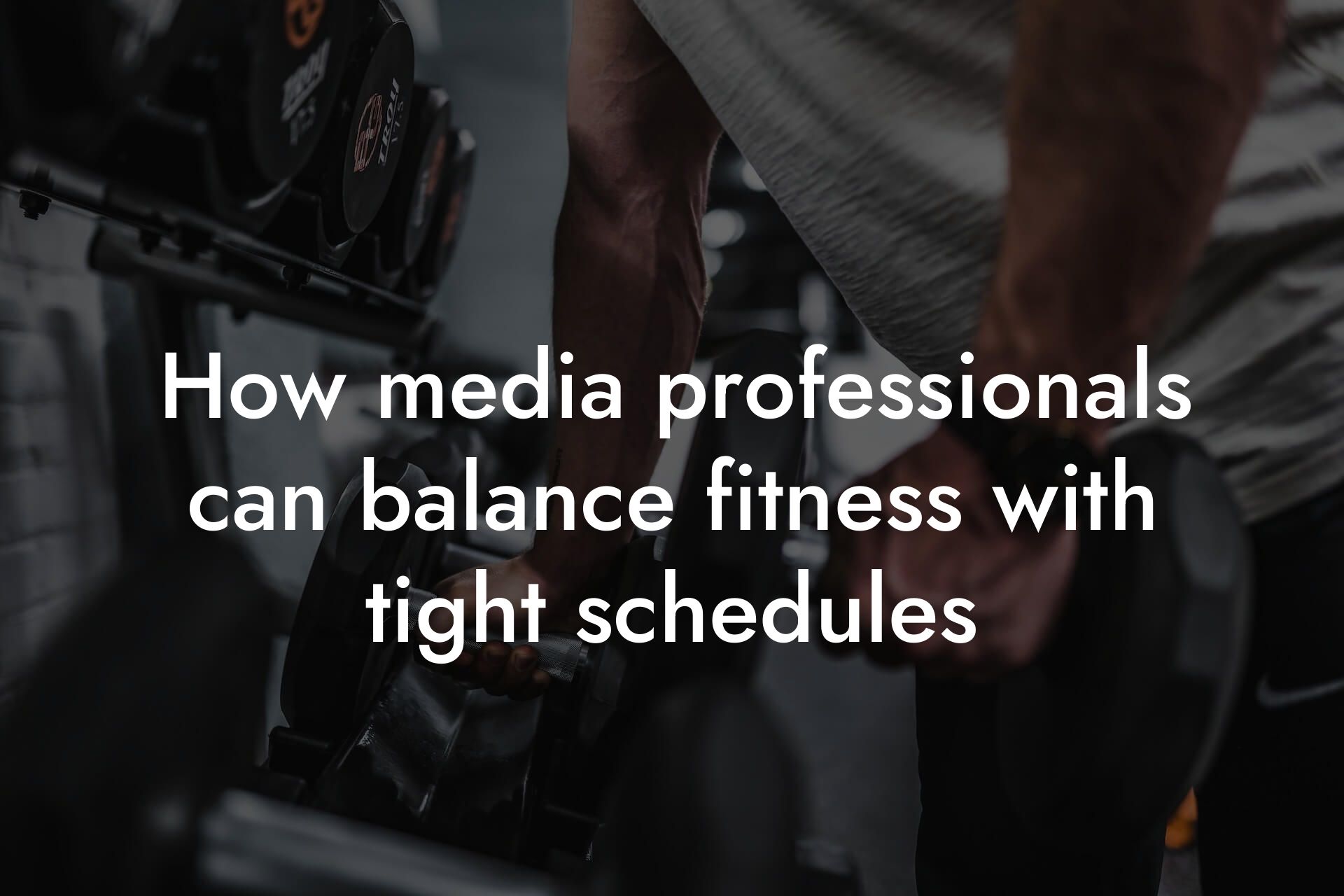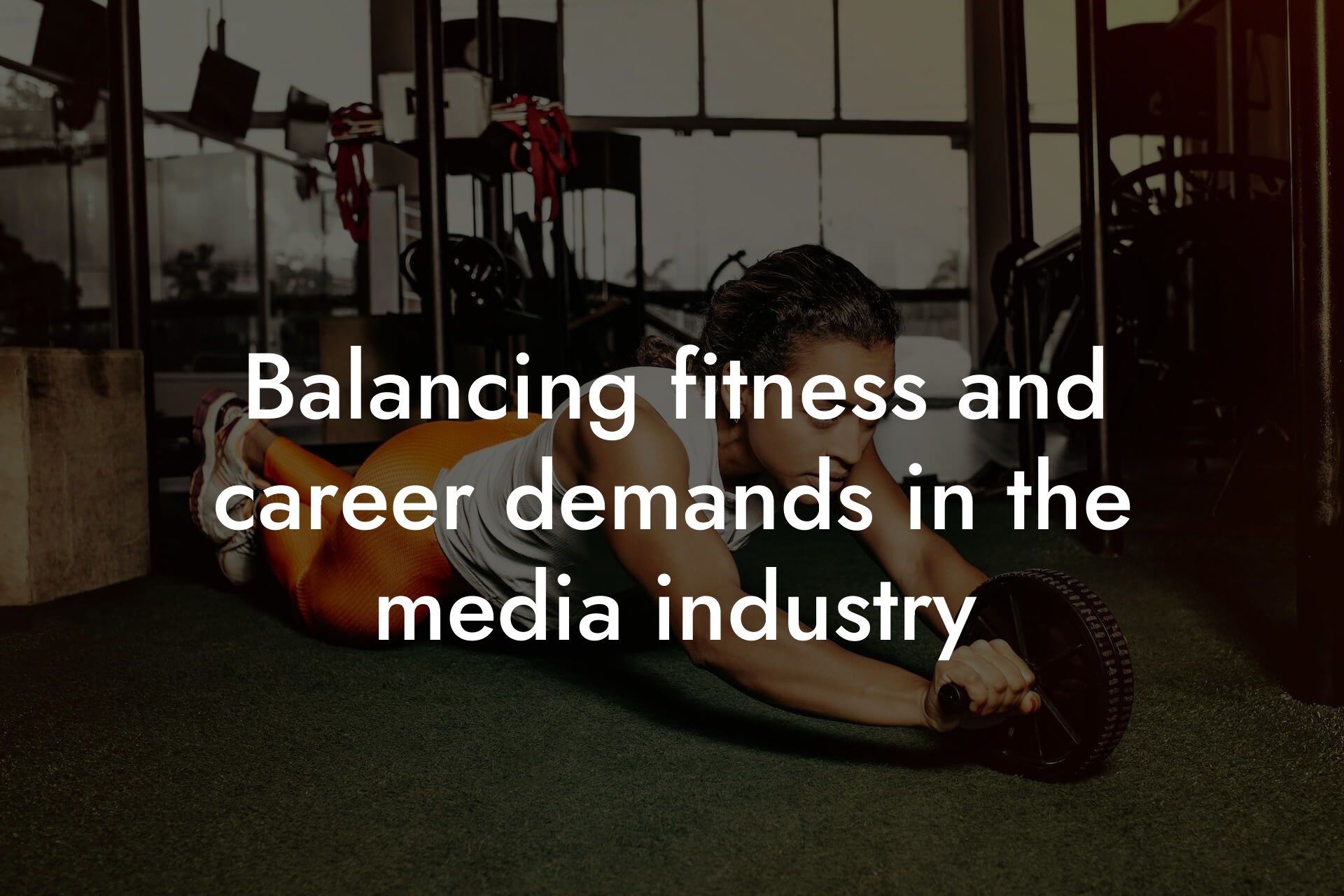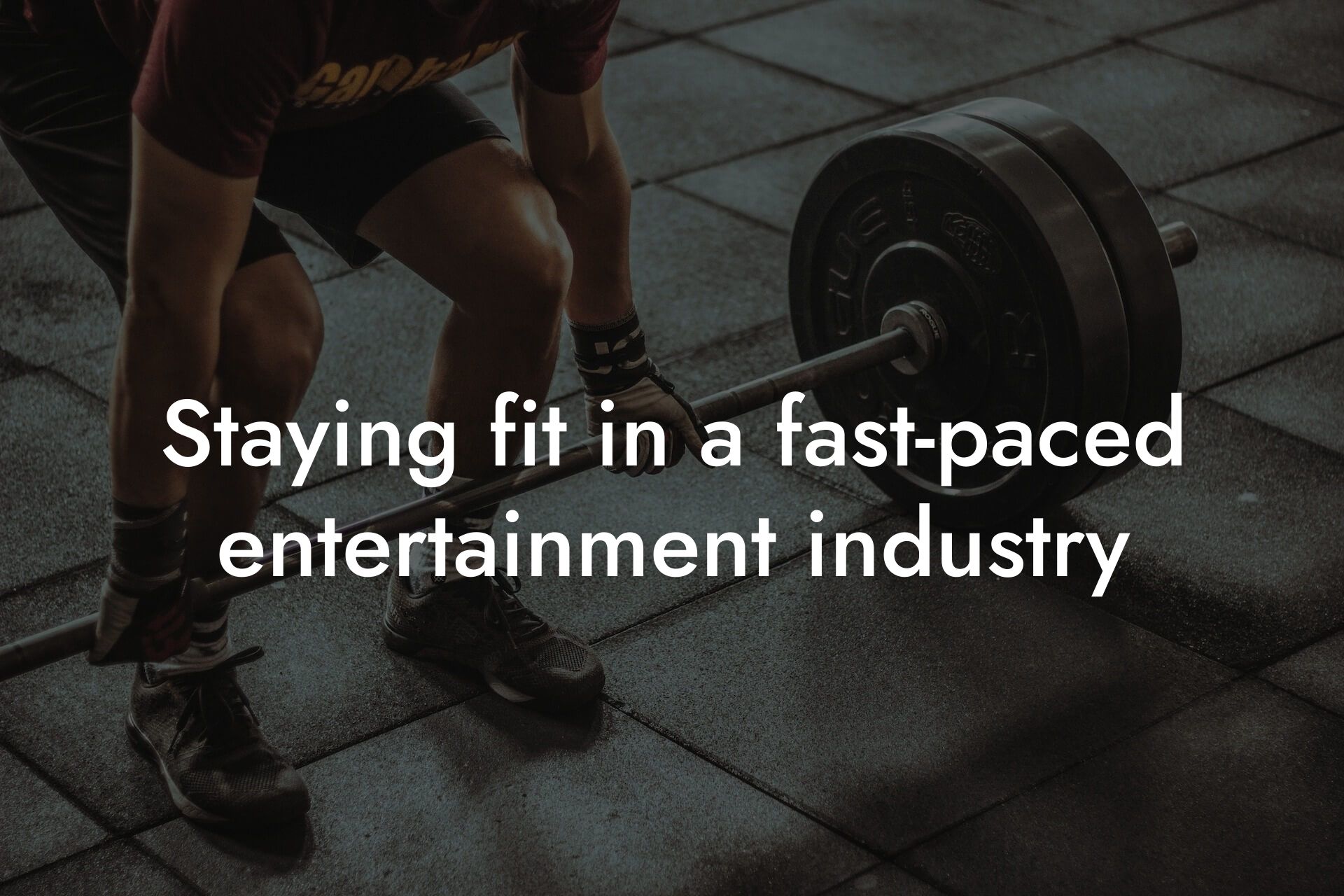As a high-earning professional in the media industry, you understand the importance of maintaining a strong physical presence to excel in your role. Your body is your instrument, and taking care of it is crucial to delivering top-notch performances. At Tano Performance Group, we recognize the significance of physical health in media roles and want to empower you with the knowledge you need to optimize your body for peak performance.
Table of Contents
- The Connection Between Physical Health and Media Performance
- The Demands of Media Roles
- The Role of Body Composition in Media Performance
- The Importance of Bone Density in Media Roles
- The Impact of Nutrition on Media Performance
- The Role of Sleep and Recovery in Media Performance
- Strategies for Improving Physical Health in Media Roles
- Frequently Asked Questions
The Connection Between Physical Health and Media Performance
Physical health has a direct impact on cognitive function, emotional well-being, and overall energy levels. When you're physically fit, you're more focused, confident, and able to tackle the demands of your media role with ease. On the other hand, poor physical health can lead to fatigue, decreased motivation, and a decline in performance quality. In the competitive world of media, you can't afford to let your physical health hold you back.
The Demands of Media Roles
Media professionals often face grueling schedules, long hours, and high-pressure deadlines. You may be required to work irregular hours, travel frequently, and maintain a high level of energy and enthusiasm. These demands can take a toll on your physical health, making it challenging to maintain a healthy lifestyle. However, it's essential to prioritize your physical well-being to avoid burnout and maintain your competitive edge.
The Role of Body Composition in Media Performance
Body composition plays a critical role in media performance. Excess body fat can lead to decreased energy levels, reduced mobility, and a decline in overall physical function. On the other hand, maintaining a lean, athletic physique can enhance your performance, boost your confidence, and improve your overall health. At Tano Performance Group, our DEXA machine provides a comprehensive body assessment, giving you valuable insights into your body composition and helping you make data-driven decisions to optimize your physique.
The Importance of Bone Density in Media Roles
Bone density is a critical aspect of physical health, particularly in media roles that require frequent movement, lifting, or other physical demands. Low bone density can increase your risk of injury, reduce your mobility, and impact your overall performance. Our DEXA machine also measures bone density, providing you with a complete picture of your physical health and helping you identify areas for improvement.
The Impact of Nutrition on Media Performance
Nutrition plays a vital role in maintaining optimal physical health. A well-balanced diet provides the energy, nutrients, and building blocks necessary for peak performance. In media roles, a healthy diet can improve your focus, concentration, and creativity, while a poor diet can lead to fatigue, decreased motivation, and a decline in performance quality. By fueling your body with the right foods, you can optimize your physical health and take your media performance to the next level.
The Role of Sleep and Recovery in Media Performance
Sleep and recovery are essential components of physical health, particularly in media roles. Adequate sleep helps your body repair, recover, and adapt to the physical demands of your role, while poor sleep can lead to fatigue, decreased motivation, and a decline in performance quality. By prioritizing sleep and recovery, you can improve your physical health, enhance your performance, and maintain your competitive edge.
Strategies for Improving Physical Health in Media Roles
Improving physical health in media roles requires a comprehensive approach that incorporates regular exercise, healthy nutrition, adequate sleep, and stress management. By prioritizing your physical health, you can:
- Improve your energy levels and reduce fatigue
- Enhance your cognitive function and focus
- Boost your confidence and self-esteem
- Reduce your risk of injury and illness
- Improve your overall performance and productivity
In conclusion, physical health plays a critical role in media performance. By prioritizing your physical health, you can optimize your body for peak performance, improve your overall well-being, and maintain your competitive edge in the media industry. At Tano Performance Group, we're committed to helping high-earning professionals like you achieve their goals by providing comprehensive body assessments, personalized coaching, and expert guidance. Take the first step towards optimizing your physical health and unlocking your full potential in the media industry.
Frequently Asked Questions
What is the relationship between physical health and performance in media roles?
Physical health plays a crucial role in performance in media roles. Research has shown that individuals with good physical health tend to perform better in their roles, exhibiting higher energy levels, improved focus, and enhanced creativity. Conversely, poor physical health can lead to fatigue, decreased motivation, and reduced productivity, ultimately impacting performance.
How does physical appearance affect one's confidence in media roles?
Physical appearance can significantly impact one's confidence in media roles. When individuals feel comfortable and confident in their physical appearance, they are more likely to take risks, speak up, and assert themselves, leading to improved performance. On the other hand, body dissatisfaction can lead to self-doubt, anxiety, and decreased confidence, ultimately affecting performance.
What are the common physical health challenges faced by media professionals?
Media professionals often face unique physical health challenges, including sedentary work habits, long working hours, and high levels of stress. These challenges can lead to issues such as obesity, musculoskeletal disorders, and cardiovascular disease. Additionally, the pressure to maintain a certain physical appearance can lead to body dissatisfaction, low self-esteem, and mental health concerns.
How can regular exercise improve performance in media roles?
Regular exercise can improve performance in media roles by increasing energy levels, enhancing cognitive function, and reducing stress. Exercise has also been shown to improve sleep quality, boost mood, and increase self-esteem, all of which are essential for optimal performance. Furthermore, regular physical activity can help media professionals maintain a healthy weight, reducing the risk of chronic diseases.
What is the impact of body fat percentage on performance in media roles?
Excess body fat can negatively impact performance in media roles by reducing energy levels, increasing fatigue, and decreasing self-esteem. High body fat percentage has also been linked to chronic diseases, such as diabetes and cardiovascular disease, which can further impact performance. Maintaining a healthy body fat percentage through a balanced diet and regular exercise can improve overall health and performance.
How does bone density affect performance in media roles?
Bone density is essential for overall health and performance in media roles. Low bone density can lead to osteoporosis, increasing the risk of fractures and osteoporotic diseases. This can impact performance by reducing mobility, increasing pain, and decreasing confidence. Maintaining good bone density through a balanced diet, regular exercise, and adequate vitamin D levels can improve overall health and performance.
What are the benefits of a healthy physique for media professionals?
A healthy physique can bring numerous benefits for media professionals, including improved confidence, increased energy levels, and enhanced overall health. A healthy physique can also improve mental well-being, reducing stress, anxiety, and depression. Furthermore, a healthy physique can improve sleep quality, leading to better rest and recovery, essential for optimal performance.
How can media professionals prioritize their physical health?
Media professionals can prioritize their physical health by making healthy lifestyle choices, such as regular exercise, a balanced diet, and adequate sleep. They can also prioritize self-care, reducing stress and anxiety through relaxation techniques, such as meditation and yoga. Additionally, regular health check-ups and screenings can help identify potential health issues early, allowing for prompt intervention and treatment.
What are the consequences of neglecting physical health in media roles?
Neglecting physical health in media roles can have severe consequences, including decreased performance, reduced productivity, and increased absenteeism. Poor physical health can also lead to chronic diseases, such as diabetes, cardiovascular disease, and obesity, which can further impact performance and overall well-being. Additionally, neglecting physical health can lead to mental health concerns, such as depression and anxiety.
How can media professionals balance their physical health with the demands of their job?
Media professionals can balance their physical health with the demands of their job by prioritizing self-care, setting realistic goals, and making healthy lifestyle choices. They can also learn to say no to excessive workload, take regular breaks, and delegate tasks when possible. Additionally, seeking support from colleagues, friends, and family can help media professionals manage the demands of their job while maintaining good physical health.
What are the benefits of working with a health coach or personal trainer for media professionals?
Working with a health coach or personal trainer can bring numerous benefits for media professionals, including personalized guidance, accountability, and support. A health coach or personal trainer can help media professionals set and achieve their health goals, improve their physical health, and enhance their overall well-being. Additionally, a health coach or personal trainer can provide media professionals with the tools and strategies they need to maintain good physical health despite the demands of their job.
How can media professionals stay motivated to prioritize their physical health?
Media professionals can stay motivated to prioritize their physical health by setting realistic goals, tracking their progress, and celebrating their successes. They can also find a workout buddy or accountability partner, try new activities and exercises, and reward themselves for their achievements. Additionally, media professionals can focus on the benefits of good physical health, such as improved energy levels, enhanced confidence, and better overall well-being.
What are the common myths about physical health and performance in media roles?
There are several common myths about physical health and performance in media roles, including the idea that physical appearance is not important, that exercise is a luxury, and that good physical health is only for athletes. However, research has shown that physical health is essential for optimal performance in media roles, and that regular exercise, a balanced diet, and good sleep habits are crucial for maintaining good physical health.
How can media professionals overcome barriers to prioritizing their physical health?
Media professionals can overcome barriers to prioritizing their physical health by identifying their challenges, seeking support, and finding creative solutions. They can also prioritize self-care, learn to say no to excessive workload, and take regular breaks. Additionally, media professionals can focus on the benefits of good physical health, such as improved energy levels, enhanced confidence, and better overall well-being.
What are the benefits of prioritizing physical health for media professionals' long-term careers?
Prioritizing physical health can bring numerous benefits for media professionals' long-term careers, including improved performance, increased productivity, and enhanced creativity. Good physical health can also lead to better mental well-being, reducing stress, anxiety, and depression. Furthermore, prioritizing physical health can improve media professionals' overall quality of life, leading to increased job satisfaction and a longer, healthier career.
How can media professionals make physical health a priority in their busy schedules?
Media professionals can make physical health a priority in their busy schedules by scheduling time for exercise, meal prep, and self-care. They can also find activities that combine work and exercise, such as walking meetings or exercising during lunch breaks. Additionally, media professionals can prioritize sleep, aiming for 7-8 hours of sleep per night, and take regular breaks to stretch and move throughout the day.
What are the consequences of ignoring physical health in media roles?
Ignoring physical health in media roles can have severe consequences, including decreased performance, reduced productivity, and increased absenteeism. Poor physical health can also lead to chronic diseases, such as diabetes, cardiovascular disease, and obesity, which can further impact performance and overall well-being. Additionally, ignoring physical health can lead to mental health concerns, such as depression and anxiety.
How can media professionals make healthy lifestyle choices despite the demands of their job?
Media professionals can make healthy lifestyle choices despite the demands of their job by prioritizing self-care, setting realistic goals, and making healthy choices whenever possible. They can also find healthy alternatives to unhealthy habits, such as choosing water over soda or taking the stairs instead of the elevator. Additionally, media professionals can seek support from colleagues, friends, and family to help them make healthy lifestyle choices.
What are the benefits of incorporating physical activity into media professionals' daily routines?
Incorporating physical activity into media professionals' daily routines can bring numerous benefits, including improved energy levels, enhanced cognitive function, and reduced stress. Regular physical activity can also improve sleep quality, boost mood, and increase self-esteem, all of which are essential for optimal performance. Furthermore, regular physical activity can reduce the risk of chronic diseases, such as diabetes and cardiovascular disease.
How can media professionals maintain good physical health despite the pressure to maintain a certain physical appearance?
Media professionals can maintain good physical health despite the pressure to maintain a certain physical appearance by focusing on health rather than aesthetics. They can prioritize healthy habits, such as regular exercise, a balanced diet, and adequate sleep, rather than trying to achieve a certain body shape or size. Additionally, media professionals can practice self-acceptance, self-compassion, and self-love, reducing the pressure to conform to unrealistic beauty standards.
Here are some related articles you might love...
- How media professionals can balance fitness with tight schedules
- Balancing fitness and career demands in the media industry
- Staying fit in a fast-paced entertainment industry
- How DEXA scans can help media professionals maintain their physique
- Quick workouts for actors and entertainers on set
- Managing stress through physical fitness in the entertainment industry
- The role of body composition in on-screen appearances
- How to maintain a fit physique during long production hours
- Nutrition tips for staying camera-ready
Zak Faulkner
Zak Faulkner is a leading authority in the realm of physical health and body composition analysis, with over 15 years of experience helping professionals optimise their fitness and well-being. As one the experts behind Tano Performance Group, Zak has dedicated his career to providing in-depth, science-backed insights that empower clients to elevate their physical performance and overall health.
With extensive knowledge of DEXA technology, Zak specializes in delivering comprehensive body assessments that offer precise data on body fat, muscle mass, bone density, and overall physique. His expertise enables individuals to make informed decisions and achieve their fitness goals with accuracy and confidence. Zak’s approach is rooted in a deep understanding of human physiology, combined with a passion for helping clients unlock their full potential through personalised strategies.
Over the years, Zak has earned a reputation for his commitment to excellence, precision, and client-focused service. His guidance is trusted by top professionals who demand the best when it comes to their health. Whether advising on fitness programs, nutritional strategies, or long-term wellness plans, Zak Faulkner’s insights are a valuable resource for anyone serious about taking their health and fitness to the next level.
At Tano Performance Group, Zak continues to lead our Content Team revolutionising how professionals approach their physical health, offering unparalleled expertise that drives real results.




